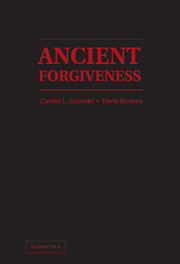Book contents
- Frontmatter
- Contents
- Contributors
- Preface
- Part I The Territory Philosophically Considered
- II Forgiveness Among The Greeks
- Part III Forgiveness Among The Romans
- Part IV Judaic And Christian Forgiveness
- 8 Mercy, Repentance, and Forgiveness in Ancient Judaism
- 9 A Man Had Two Sons
- 10 Jesus’ Conditional Forgiveness
- 11 Forgiveness in Patristic Philosophy
- 12 Forgiveness and Perfection
- Bibliography of Works Cited
- Index
- References
11 - Forgiveness in Patristic Philosophy
The Importance of Repentance and the Centrality of Grace
from Part IV - Judaic And Christian Forgiveness
Published online by Cambridge University Press: 05 January 2012
- Frontmatter
- Contents
- Contributors
- Preface
- Part I The Territory Philosophically Considered
- II Forgiveness Among The Greeks
- Part III Forgiveness Among The Romans
- Part IV Judaic And Christian Forgiveness
- 8 Mercy, Repentance, and Forgiveness in Ancient Judaism
- 9 A Man Had Two Sons
- 10 Jesus’ Conditional Forgiveness
- 11 Forgiveness in Patristic Philosophy
- 12 Forgiveness and Perfection
- Bibliography of Works Cited
- Index
- References
Summary
An analysis of forgiveness in the most philosophically minded and representative patristic authors, especially Clement of Alexandria, Origen, Gregory of Nyssa, Gregory Nazianzen, Augustine, and also John Chrysostom, suggests that they understood forgiveness, whether it comes from God or from human beings, as deeply related to the core notion of divine grace but not as unconditional. In addition, a crucial role in their reflection on forgiveness was played by their soteriological and eschatological doctrines.
Clement
Clement was the disciple of the Christian Stoic Pantaenus in Alexandria, and his thought can be considered a precursor of the doctrine of apokatastasis, which was then developed by Origen, who may have been a disciple of his, and who, in any case, was well acquainted with his works. Clement attaches a great importance to forgiveness, including interpersonal forgiveness, even to the point of presenting it as an essential feature of the “gnostic” – that is, the perfect Christian, in Stromateis 7.13.81: such a person “never remembers those who have sinned against him but forgives [aphiēsi] them. This is why this person righteously prays, too, saying: ‘Forgive [aphes] us, since we forgive [aphiemen] in turn.’ For this, too, is one of the things that God wishes: to crave nothing, to hate no one. For all humans are the work of one will [henos thelēmatos].” According to Clement, a “gnostic” will forgive because he or she will hate no one, because God wanted all human beings to exist, and because they all come from one single will. The idea of the unity of all humanity in Clement is essential, as it is in Origen and, with particular emphasis, in Gregory of Nyssa; indeed, it is one of the main bases for their universalism in soteriology. Moreover, the notion of creation as an act of will is typical of the Alexandrian school in the time of Clement: both Pantaenus and Ammonius Saccas – who was the teacher of Origen and of Plotinus as well – saw creation as the fruit of God’s will, which made itself substance. Pantaenus in fragment 2 Routh says that the logoi in God’s mind are called by scripture “God’s wills,” because the Godhead created everything by its will (thelēmati) and knows all beings “as its own wills” (hōs idia thelēmata), and Ammonius (ap. Hierocles of Alexandria ap. Phot. Bibliotheca cod. 251.461b–462b) claimed that God’s will (boulēma) was enough for the constitution of the beings and that the divinity created each thing by its will (thelōn) and knows the beings “as its own wills” (hōs idia thelēmata).
- Type
- Chapter
- Information
- Ancient ForgivenessClassical, Judaic, and Christian, pp. 195 - 215Publisher: Cambridge University PressPrint publication year: 2011

